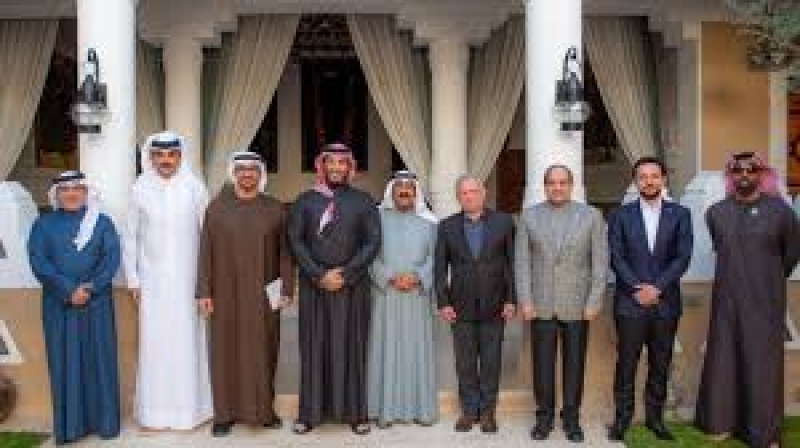- Fire breaks out at jacket factory in Chattogram |
- Dhaka, Delhi agree to bring down border killings to zero |
- Natore’s Baraigram OC closed over negligence in bus robbery case |
- Imported fruit prices surge by up to Tk 100 per kg |
- 35% of air pollution in BD originates from external sources: Experts |
Arab Leaders Meet in Saudi Arabia to Plan Gaza's Reconstruction

Arab leaders gathered in Riyadh on Friday to devise a comprehensive plan for Gaza’s post-war reconstruction in response to Donald Trump’s controversial proposal for the United States to assume control of the territory, excluding its Palestinian inhabitants.
Trump’s plan has sparked widespread condemnation across Arab states, uniting them in opposition. However, lingering differences remain regarding the governance of Gaza and the necessary financial support for rebuilding efforts.
A photo from the meeting captured Saudi Arabia’s de facto leader, Crown Prince Mohammed bin Salman, alongside leaders from Gulf states, Egypt, and Jordan. According to a Saudi source, the gathering concluded without a final statement, as the discussions were deemed confidential.
The official Saudi Press Agency described the meeting as a “fraternal consultative” session, where leaders exchanged views on regional and international issues, particularly concerning efforts to support the Palestinian cause and developments in Gaza.
Egyptian President Abdel Fattah al-Sisi’s office confirmed his departure from Riyadh after the sit-down with leaders from Bahrain, Jordan, Kuwait, Qatar, Saudi Arabia, and the UAE.
A Historic Juncture
Trump's proposal to "take over" Gaza and displace its two million residents has drawn global outrage. Andreas Krieg, an expert at King’s College London, emphasized the critical moment in the Arab-Israeli conflict. “We are at a historic juncture, where the U.S. under Trump may create irreversible facts on the ground,” he said before the meeting.
The Saudi source confirmed that the summit focused on discussing a reconstruction plan designed to counter Trump’s proposal. With Gaza in ruins after over 15 months of conflict between Israel and Hamas, the United Nations has estimated that reconstruction could cost upwards of $53 billion.
During a meeting with Trump on February 11, Jordan’s King Abdullah II mentioned Egypt would present a plan for Gaza’s future. The Saudi source indicated that this plan would be discussed during the summit.
The Saudi Press Agency reported that the outcome of the unofficial meeting would be included in the agenda for an emergency Arab League summit set to take place in Egypt on March 4.
Financing Challenges
The Arab leaders view an alternative reconstruction plan for Gaza as vital, especially after Trump highlighted the enormous scale of rebuilding as a rationale for removing the Palestinian population. While Egypt has yet to release the specifics of its plan, former Egyptian diplomat Mohamed Hegazy outlined a strategy in three technical phases over three to five years.
The first phase, lasting six months, would focus on “early recovery,” including debris removal. The second phase would involve an international conference to finalize plans for reconstruction and restoring Gaza’s infrastructure. The final phase would involve providing housing and services, while launching a political track to advance the two-state solution—an independent Palestine alongside Israel.
An Arab diplomat familiar with Gulf affairs noted that the main obstacle to the Egyptian plan’s success lies in securing adequate financing. “It would be inconceivable for Arab leaders to meet without reaching a common vision,” the diplomat stated. “The challenge is translating that vision into a workable plan.”
Krieg emphasized the opportunity for Saudi Arabia to unite the Gulf Cooperation Council countries, along with Egypt and Jordan, to create a unified response to Trump’s proposal. "This is a unique moment for the Saudis to lead the charge and find common ground on such a high-stakes issue."

